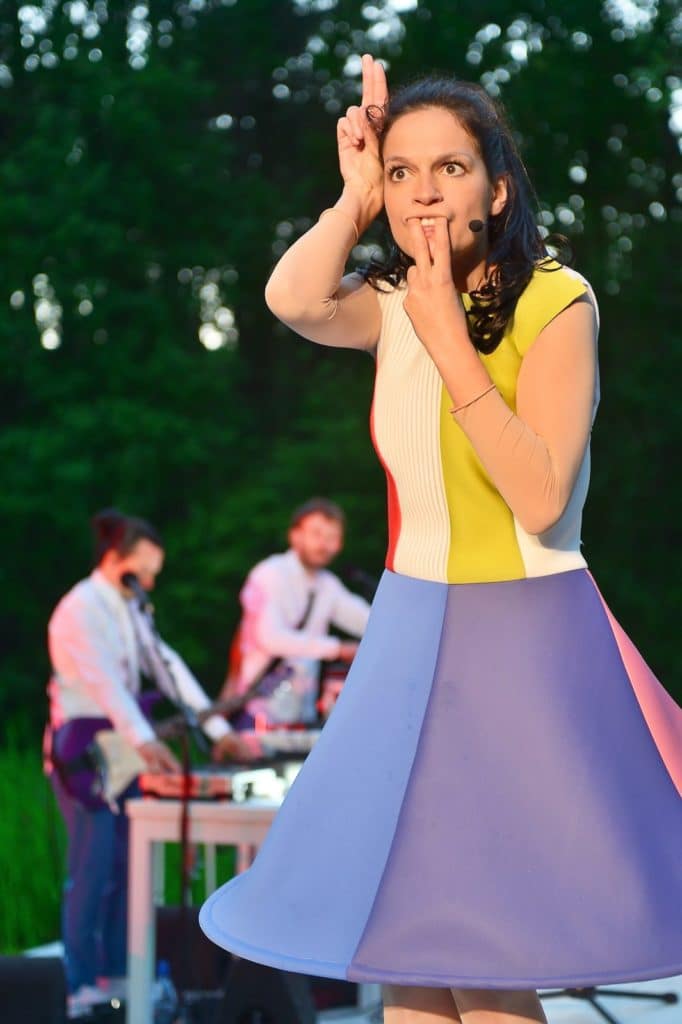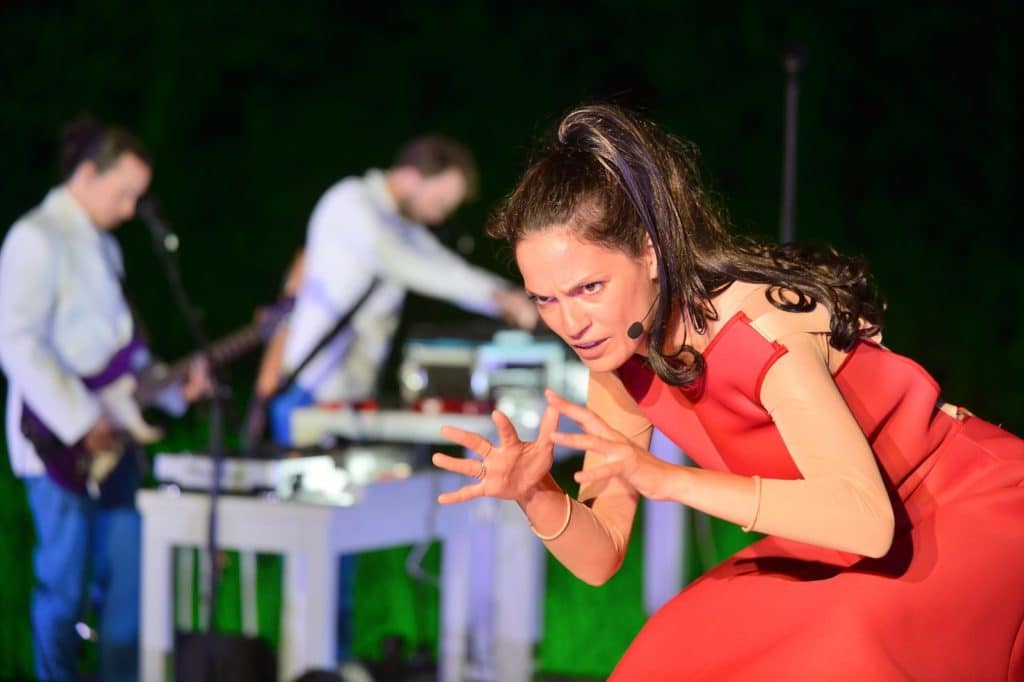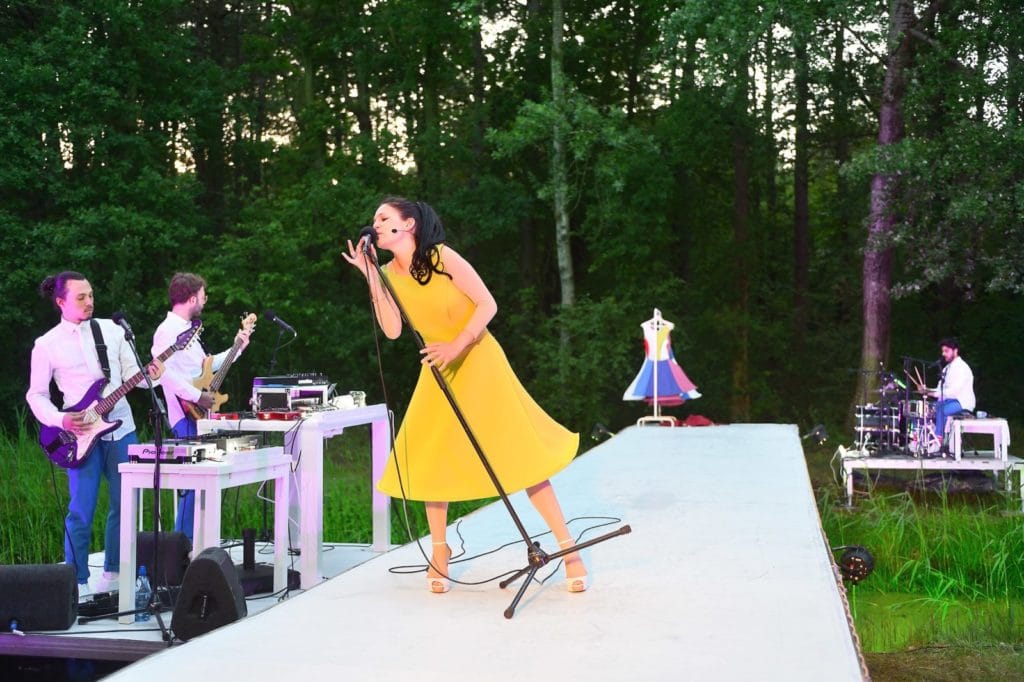'I once performed in front of a hall somewhere in the middle of nowhere, with a lot of old people. The performance was announced as cabaret. But my work does not fall within one particular genre. Because of the designation 'cabaret', the audience had expectations that I did not meet. People wanted a fun, entertaining evening. My performance was rebellious, energetic. I jumped all over the place and even sat on someone's lap. People were startled. At one point, an old woman stood up. She was sitting in the middle of the row and started rattling and stumbling her way down the aisle with her walker. "This is not funny!" she shouted. "You are not an actress! You can't do anything!" Whining, she left the auditorium. There I stood. Alone in front of a room full of people.'
Confusion
It was an extreme, thankfully one-off event that theatre-maker Stephanie Louwrier had to face. But confusion about the kind of theatre she makes has coloured her career from the start. The experience that what she did and wanted did not match expectations made her feel like a failure. The resulting crisis is the breeding ground for her new performance, Revolution of failure.
'That crisis was a long time of stagnation,' she says. 'As if demons in my head told me that I would never succeed in making what people asked for anyway. Gradually the desire arose in me to make a performance about that dark time. All people have such demons, inhibiting what they would actually want. Weird basements in the head. These cause problems, but also make a person unique. We should cherish our moments of failure. Not hide them away. This insight is so basic and generally human. In fact, it is Revolution of failure an ode to humanity.'

Successful graduation project
While studying at the Maastricht Drama Academy, Stephanie Louwrier could not have guessed that she would end up at this point. 'As a graduation project, I had to make a solo performance. I thought it was terrible. I considered myself an actress then. What I wanted was just to play a role with a ready-made text. Making something on my own and performing it myself, the text, the scenes, everything: I couldn't see myself doing that at all.'
Nevertheless, she fulfilled the task gloriously. Pauvre Lola had great success. 'People thought it was funny. That surprised me, because I felt I had put on a very serious performance.'
Squeezing box
During a performance at De Parade, she was 'discovered', where she was labelled a 'cabaret performer'. The problem of expectations was growing. 'If you are placed in a genre, you have to deliver what fans of that genre like. I started writing on the joke, giving people an amusing evening.'
'My performances definitely have humour, even now. I think humour is very important. But I want to push through, to move people through that humour, take them out of their comfort zone, make them feel discomfort. So more than the box allowed. It became more and more difficult. Commercially, it is not useful if you do not fall within a genre. So I was advised: make a choice, otherwise you won't become a big name. And the latter should. That's the norm.'
'This is where I got stuck. I felt the freedom in my head, the creativity was stalling.'
Everyone on edge
The confrontations with the audience had many sides, including positive ones. 'I like to involve the audience in the performance. During one performance, I spoke to a woman. I asked her what she used to want to be. She told me that she had wanted to be a dancer, but then also secretly for the applause, because she had never received it. Afterwards, I brought her to the front and she received a standing ovation. She had tears in her eyes. Yes, moments like that are of course unique.'
The demons within yourself
Despite such inspiring moments, Louwrier did not keep up her performances. She cancelled all her appointments and commitments. There she stood. No work. No prospects. Only the feeling: 'I have failed'. Everyone had hailed her as 'the young talent'. From all sides, people had shouted: 'Now it's going to happen'. Instead, she sat at home and encountered the demons, her fear and insecurity. Her idea that her chances were gone. That there was no place for her anymore.
During this time of crisis, actor/director Titus Tiel Groenestege came to her rescue. She sat down at his home with him at the kitchen table, with a bottle of wine. They talked and talked. He put her in touch with Rudolphi Productions. 'I started talking there. It dawned on me that I belonged there. Rudolphi Productions is a production house open to crossovers between genres. Ideas arose in me to make a performance about the crisis I had gone through. About the demons, the beast within myself, that I had to embrace. Slowly the light and energy returned. I was so preoccupied with the rest of the world that I was no longer in the moment. You have to push your ego aside, because only then can beautiful moments emerge.'

Endless energy
This is how Stephanie freed herself from the compulsion to choose a particular genre. 'How to Revolution of failure should place is hard to say. Ko van den Bosch, who produces the text of the show with me and does the final direction, gives as a description: a mix of theatre with television or film, a combination of rap with ballads and standup comedy with poetry. But really, the bottom line is that there is no need to put into words what kind of performance it is. You just have to see it to find out. I played a preview at Oerol. There it turned out that people effortlessly saw what I meant. You have to see the performance as an experience in itself. Afterwards, people came up to me sharing their own experiences of failure with tears in their eyes.'
'The performance is about fighting the fear of failure, of failure. That fear is a beast within you. It feeds on what you experience and can loom up at any moment. You have no control over it. The performance is about how I try to suppress that fear. It brews in my head. That I have this fear is something I curse in myself. That includes my boundless energy. What people see about me when I am on stage is a very energetic person. With that bubbling energy, this beast in me is unleashed. I have a love-hate relationship with it. My energy is part of the beast, but at the same time it has something to do with what I am looking for.'
'I come across as a strong woman. But it's nice to be able to show my other side as well: ugly and shy.'
Rest full of energy
'I am calmer in this new performance, but that energy is still there. I feel the urge to let the energy flow, to engage people, to seek out discomfort. It would be so much easier to make a performance that is braver, within the lines, just a monologue, for example. But I didn't succeed. I often felt like a failure because I didn't fit into a box.'
'That this kind of theatre attracts me so much, that I feel at home with this, has been quite a discovery since I finished my education in Maastricht. Back then I thought: I'll never be able to make something on my own. But now I find it a relief. Deciding for myself what I make and play, while it also always holds something frightening: playing on life and death.'

Room for improvisation
'A lot has changed since the preview at Oerol. I watched the video recording and see now how much I was still trying to please the audience then. I recognise the insecurity I felt then. Now I am in a different frame of mind. Tell what you want to tell, I tell myself. People will come. I embrace the fear of failure. Much in the performance is fixed, but I keep room for improvisation. I need that, but it also brings danger. Things can go wrong. That keeps it exciting.'
'Now that I am showing myself as I want to show myself, I hope people will recognise it and say, "This is it". I am now two weeks before the premiere and feel I am face to face with the beast every day. I'm flying in all directions. The little voice that says "You can't do it, people don't like it, they will never understand you". It constantly echoes in my head. But I tell myself, "Just accept it. This is who I am and what I make".'
Matthias Mooij
'One of the scenes of Revolution of failure I based it on an impressive experience with director Matthias Mooij. I worked with him. And we had a good click. In 2014, he passed away. Before his death, I was asked if I wanted to visit him. At the hospital. Even then, the beast in me reared its head. "Why am I being asked to look him up? We haven't seen each other for a while. What can I still do for him?" Non-things like that crossed my mind when something as important as someone's impending death was going on! I went to see him. On entering, I made a joke. He laughed. It was hard to turn off the beast. It became a very personal experience. A scene in the performance is about this.'
'I try to stir something up, to give people an enjoyable evening, but also to touch them in such a way that they are still talking about it after the performance. Then, of course, it can happen that I get too close for people who only come to be amused. They find that uncomfortable. But I now think, 'Let the uncomfortable be uncomfortable. I like that.'
Intensely happy
Earlier, Stephanie Louwrier had one of the lead roles in the movie Intensely happy. In it, she plays a woman who meets an attractive man. She behaves towards him as the perfect, successful woman. But in-between, repeatedly inserted flashes show how she fights against her inferiority complex, the scathing criticism she has of herself, the conviction that she is absolutely not worth that this man sees anything in her. It is apparently a common thread in Louwrier's work. This struggle. The dazzling exterior and the battle she fights with herself in the inner darkness.
Revolution of failure4 April to 23 May in Dutch theatres. Premiere: 6 April, De Lieve Vrouw in Amersfoort.
Playlist: www.rudolphiproducties.nl
